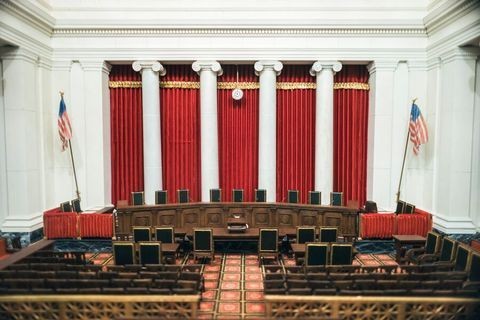Lyndsay A. Gorton
Overview
Lyndsay Gorton is a Government Contracts partner in Crowell & Moring’s Washington, D.C. office. Her practice focuses on government contracts litigation and counseling, including government investigations, fraud matters under the False Claims Act, bid protests, and federal and state regulatory compliance. In addition to her primary government contracts practice, Lyndsay has federal court litigation experience representing a broad variety of clients in commercial litigation matters, and has led and managed teams at every stage of litigation, including discovery, dispositive motion practice, trial, and settlement. She also uses her litigation experience to assist her clients with internal investigations, risk management, and compliance.
Lyndsay also maintains an active pro bono practice and is currently representing a client before the U.S. Court of Appeals for the Sixth Circuit in an appeal of a district court decision under the Hague Convention on the Civil Aspects of Child Abduction.
Career & Education
- American University Washington College of Law, J.D., 2010
- College of William & Mary, B.A. & B.S., anthropology and psychology, 2007
- District of Columbia
- Virginia
- U.S. District Court for the District of Columbia
- U.S. District Court for the District of Maryland
- U.S. District Court for the Eastern District of Texas
- U.S. District Court for the Eastern District of Virginia
- U.S. District Court for the Western District of Virginia
Lyndsay's Insights
Webinar | 03.12.26
The federal government has identified purported ‘waste, fraud, and abuse’ in small business programs as a major focus of its current enforcement efforts. As it relates to federal procurement, we have seen audits and investigations rolled out not only of active participants in the Small Business Administration’s 8(a) Business Development Program but also reviews of various types of small business contracts (such as 8(a) sole source and set-aside awards, preference-based awards, and small business set-aside awards over particular values). Join Crowell & Moring as we discuss what aspects of contract performance and teaming arrangements are being scrutinized (e.g., size/status eligibility, limitations on subcontracting compliance, reasonableness of market rates, etc.) and how these considerations can impact both small government contractors holding the prime contracts under review and their subcontractors.
Speaking Engagement | 01.08.26
"What Will the New Year Bring in 2026?" Crowell & Moring Webinar.
Press Coverage | 01.02.26
Blog Post | 12.15.25
Eleventh Circuit Hears Argument on False Claims Act Qui Tam Constitutionality
Representative Matters
- Represents government contractors relating to alleged violations of the civil False Claims Act and Anti-Kickback Act in District Courts around the United States, including in the District of Columbia, the Eastern District of Virginia, and others.
- Represents government contractor in the United States Court of Appeals for the District of Columbia appealing a successful defense of protest challenging award of contract by Washington Metropolitan Area Transit Authority.
- Serves as second chair trial counsel for a Fortune 20 company in the largest pharmaceutical multi-district litigation in the country.
- Represents government contractors in responses to non-party subpoenas issued pursuant to Rule 45 of the Federal Rules of Civil Procedure (FRCP) in various types of federal court litigation.
- Represents government contractors on investigations provided to various inspector general offices and federal agencies, including the Department of Defense and the Senate Permanent Subcommittee on Investigations.
- Represented associations serving Alaska Native regional and village corporations as intervenor-defendants in federal district court litigation under the Administrative Procedure Act challenging the Secretary of Treasury’s determination of which “Tribal governments” are eligible for relief funds under the Coronavirus Aid, Relief, and. Economic Security Act (CARES Act).
- Completed secondment to a technology-focused government contractor to assist with internal investigations based on ethics hotline complaints.
- Represented small business government contractors on bid protests at the Government Accountability Office (GAO), including a successful entitlement for costs.
- Represented a small business subcontractor in a prime contractor-subcontractor dispute through the course of state court litigation.
- Represented government contractors and other companies before state and federal courts to defend employment-related claims brought under federal and state law.
- Participated in two trial teams based on federal preemption and constitutional law questions related to local agency decisions to award on state power grids.
Lyndsay's Insights
Webinar | 03.12.26
The federal government has identified purported ‘waste, fraud, and abuse’ in small business programs as a major focus of its current enforcement efforts. As it relates to federal procurement, we have seen audits and investigations rolled out not only of active participants in the Small Business Administration’s 8(a) Business Development Program but also reviews of various types of small business contracts (such as 8(a) sole source and set-aside awards, preference-based awards, and small business set-aside awards over particular values). Join Crowell & Moring as we discuss what aspects of contract performance and teaming arrangements are being scrutinized (e.g., size/status eligibility, limitations on subcontracting compliance, reasonableness of market rates, etc.) and how these considerations can impact both small government contractors holding the prime contracts under review and their subcontractors.
Speaking Engagement | 01.08.26
"What Will the New Year Bring in 2026?" Crowell & Moring Webinar.
Press Coverage | 01.02.26
Blog Post | 12.15.25
Eleventh Circuit Hears Argument on False Claims Act Qui Tam Constitutionality
Insights
Pharmaceutical Products Liability Litigation Impossibility Pre-emption Defence
|06.07.22
International Law Office
FEATURE COMMENT: The Top FCA Developments Of 2021
|02.16.22
The Government Contractor, Vol. 64, No. 7
- |
09.16.20
The Government Contractor, Vol. 62, No. 34
Waynesboro Election Officials Vow To Appeal If Court Forces Them To Certify Election
|10.28.24
The News Virginian
White House Push To Reform Mining Law Draws Skepticism From Opponents, Advocates
|02.25.22
IHS Markit
Eleventh Circuit Hears Argument on False Claims Act Qui Tam Constitutionality
|12.15.25
Crowell & Moring’s Government Contracts Legal Forum
Lyndsay's Insights
Webinar | 03.12.26
The federal government has identified purported ‘waste, fraud, and abuse’ in small business programs as a major focus of its current enforcement efforts. As it relates to federal procurement, we have seen audits and investigations rolled out not only of active participants in the Small Business Administration’s 8(a) Business Development Program but also reviews of various types of small business contracts (such as 8(a) sole source and set-aside awards, preference-based awards, and small business set-aside awards over particular values). Join Crowell & Moring as we discuss what aspects of contract performance and teaming arrangements are being scrutinized (e.g., size/status eligibility, limitations on subcontracting compliance, reasonableness of market rates, etc.) and how these considerations can impact both small government contractors holding the prime contracts under review and their subcontractors.
Speaking Engagement | 01.08.26
"What Will the New Year Bring in 2026?" Crowell & Moring Webinar.
Press Coverage | 01.02.26
Blog Post | 12.15.25
Eleventh Circuit Hears Argument on False Claims Act Qui Tam Constitutionality





